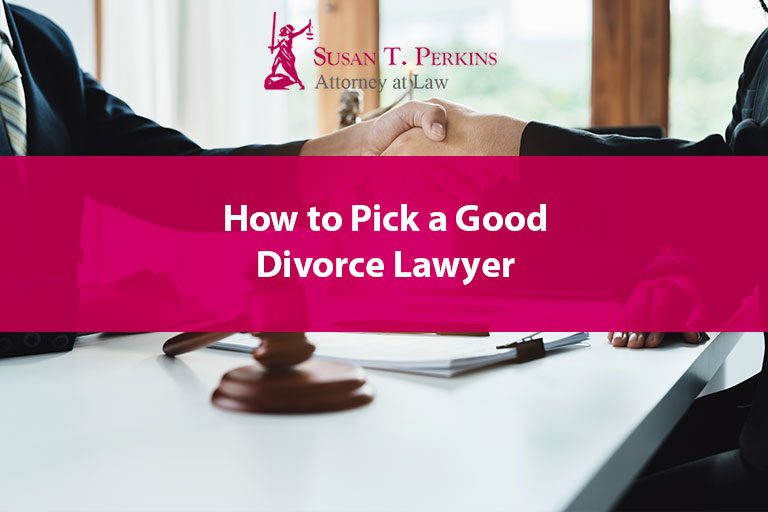Sometimes a divorce is your only path forward. In fact, approximately 50% of all marriages end in divorce. If your marriage is headed down this path, you’ve probably got a lot of questions running through your mind.
How to pick a good divorce lawyer is rarely the first thing people think of. You might even be surprised to learn this question should be your top priority. Hiring a skilled attorney as soon as possible is the best way to protect your best interests. But at the same time, you never want to rush this decision.
As a skilled and experienced Rhode Island divorce lawyer, the Law Offices of Susan T. Perkins Esq. successfully represented clients in complex divorces for over 20 years. Today, we’re sharing everything you need to know about picking a good divorce lawyer.
By the time you’re done reading, you’ll have a foolproof process for narrowing down your options and making a final decision.
What to Look for in a Divorce Lawyer
If you do a Google search for attorneys near you, you’re going to get a lot of results. The sheer number of options is enough to feel overwhelming. Luckily, looking for a few specific qualities will help you quickly find some good options.
The first thing to look for is whether they practice family law. Many attorneys work only on criminal defense cases, or personal injury claims, or any number or other specialties. Make sure the attorneys you’re considering actually practice and specialize in family law.
Next, it’s crucial to pick a successful divorce lawyer with experience. It’s true that no 2 divorces are exactly the same. The thing is, your divorce proceedings can only go one of a few ways. You want somebody extremely familiar with mediation, contested divorces, and uncontested divorces. Hiring an experienced attorney means you can rest easy knowing they’re prepared for anything.
The last major aspect to consider is their compatibility with you. You’re not looking for a new best friend, but you do need to trust and feel comfortable with your attorney. If your lawyer isn’t candid with you and you can’t make yourself talk about relevant details, you two aren’t a good fit for each other.
Payment: What to Expect and How to Pay
The average total costs for a divorce are between $7,000 and $23,300. Your costs ultimately depend on how long your proceedings take. If everything can be sorted out in 6 months or less, you’ll be at the lower end of that range. But if things drag on for more than 2 years, you’ll be closer to the 5-figure range.
There are a few other details to keep in mind, too. Here at our law firm, we offer a free consultation to all new clients. Some divorce lawyers charge for their initial consultation. Most will charge you an hourly rate, but there are some who charge a flat fee per task. These details all factor into what you should expect to pay.
You should also know that everything your divorce lawyer does for your case is billable. Talking with your spouse’s attorney, preparing paperwork, and even emailing you will appear on your invoice.
Just remember that a great divorce lawyer has years of experience navigating the legal system. While you may be surprised at the little things you’re billed for, every seemingly little task is focused on achieving the best possible outcome for you. What could be more valuable than that?
When it comes to how you’ll pay, ask about this during your consultation. They should be able to give you general pricing and information on their billing practices. Every divorce lawyer does invoicing and payment schedules differently.
Who Pays Attorney Fees in a Divorce?
Generally speaking, each spouse is responsible for their own attorney fees in a divorce. However, there are a few cases where you could be awarded the cost of your attorney fees.
If you’re a dependent spouse and you qualify for post-separation financial support—like alimony—you may petition the court to get your attorney fees paid by your spouse. If you’re successful, you’ll be awarded “reasonable” legal costs. The threshold for reasonable legal costs is at the judge’s discretion.
You may also win your petition if your spouse has acted in bad faith. If they’ve caused your divorce proceedings to drag on just to make your life difficult, you could be awarded attorney fees. Proving this can take some extra legwork, but in some cases it’s worth it.
If Your Case Goes to Divorce Court, Will There Be Extra Fees?
If your case goes to divorce court—also called a trial—you’ll most likely pay more than you would for a divorce settlement. Going to trial for your divorce requires more paperwork, preparation, and time than agreeing on a settlement.
Whether your divorce lawyer charges by task or by the hour, this extra work will cost you. There are also court fees and other related expenses to keep in mind.
The only scenario where going to divorce court might be cheaper is if you and your spouse can’t agree on anything. When your choices are either hours of fruitless negotiations between attorneys or letting a judge settle things, going to court might be faster and cheaper overall.
What Questions Should I Ask When Getting a Divorce?
When you’re getting a divorce, be sure to ask these questions of every divorce lawyer you consider:
- How long do you estimate it’ll take to resolve my divorce? What strategy will you use for my case?
- What is your turnaround time for returning my phone calls? How do I contact you in emergency situations? What sorts of things do you consider to be emergencies?
- Are you specifically a divorce lawyer, or what other kinds of cases do you take? How experienced are you with divorce cases and family law?
- What is your hourly rate and billing process? What do you charge while I’m working with paralegals or other members of your team? What is your retainer fee?
- What do you estimate the total cost of my divorce will be? (Keep in mind most divorce lawyers won’t have a cut and dry answer. Every divorce differs greatly, and the exact details of yours will impact your estimated costs. If the lawyer gives you a very low estimate, that’s a red flag.)
- What expenses, other than fees paid to you, do you think I’ll have to pay? Will we need private investigators, a psychologist, etc? How will you bill me for their services?
- Who else from your office will work on my case? How much experience do they have? Could I meet them?
- Does your law firm allow direct negotiation with my spouse, or what other ways can I keep costs down? Is there anything I can do on my own to reduce the amount of work and time you’ll charge me for?
- Can you help me understand the impact my decisions will have on my taxes moving forward? (Lawyers aren’t accountants, but a good divorce lawyer should be able to give you the broad strokes of what to expect.)
- Based on everything you now know about my case, what ruling do you predict a judge would make?
The answers to these questions should give you a clear indication as to whether a divorce lawyer will be a great fit for you. Remember to watch out for red flags. Trust your instincts if you don’t feel comfortable moving forward based on the answers you receive.
Your 10-Step Process to Picking the Best Divorce Lawyer for You
Now you know what qualities to look for in a good divorce lawyer. You’re also armed with questions to help narrow down your options. But how exactly do you navigate this process? Follow this 10-step process and you’re sure to find an attorney that’s a great fit.
1. Get a clear understanding of what your divorce lawyer does and doesn’t offer. Even the most skilled and knowledgeable attorneys aren’t therapists, accountants, or life coaches. These professionals understand how emotional and draining a divorce can be, but their job is seeing you through the legal proceedings. They can’t tell you whether or not to get divorced.
2. Make sure you have realistic expectations of your divorce lawyer. While it’s important for them to know what’s most important to you in the divorce, stick to logical facts. Avoid venting your emotions to your lawyer—emotions aren’t going to improve your settlement or speed up the legal proceedings.
3. Come to terms with the type of divorce you need. Will you and your spouse go through mediation? Is the divorce contested or uncontested? Knowing basic details about the conflict level in your divorce makes it much easier to find the right divorce lawyer for you.
4. Figure out your budget ahead of time. Even if finances are tight, it’s always worth talking to a divorce lawyer. Knowing your budget means you can manage expenses throughout the proceedings, and strategically decide what to get an attorney’s help with.
5. Start doing research online. Google divorce lawyers in your area and start looking through their websites. Today, every skilled lawyer has their specialties, experience, and more clearly listed on their website. This makes it easy to start narrowing down options before you make a single phone call.
6. Talk with your loved ones. Especially if you’re close with somebody who’s gotten a divorce, they may be able to give you a recommendation—or tell you which attorneys to avoid. Also try to find out the name of the attorney who represented their spouse. This can be a great way to find a skilled divorce lawyer.
7. Keep the questions we mentioned above handy. You should ask these of every attorney you speak with. At the very least, find answers to these questions on each lawyer’s website. Feel free to add specific questions about property, custody, and alimony if these things are important to you.
8. Start interviewing your top choices. Try starting with 2 or 3 and comparing their answers. You absolutely don’t have to hire the first divorce lawyer you meet with. Be sure to take the time to really explain your case. It might be tiresome to recount these details but doing so will serve you in the long run.
9. Keep your eyes peeled for red flags. A great divorce lawyer will answer your questions and treat your case as a priority. If you get the feeling that a lawyer is inexperienced, uninterested, or low-balling prices to get you to sign something, pay attention. You’re going to work with this person for months, potentially years in messier divorces.
10. In the end, pick the divorce lawyer that feels right. After you’ve done all this research, you should have a clear idea of your top 1 or 2 choices. Keep in mind that you’re going to be sharing intimate details of your life with your attorney. If you feel like you can’t trust them, trust that feeling and pick someone else.
Do You Need a Divorce Lawyer?
If you need a divorce lawyer, odds are you need one fast. The sooner you have legal representation, the sooner you can start protecting yourself. You see, all divorce proceedings have a lot of moving parts—no matter how amicable your divorce may be. It can be hard to juggle everything required of you without a great divorce lawyer by your side.
Over her years representing individuals through divorce mediation, contested divorces, alimony, and military divorce, Susan T. Perkins has seen and heard it all. She now offers 24/7 support and free consultations to people in Rhode Island, Massachusetts, and Connecticut.
If you need an experienced divorce lawyer who will stay by your side every step of the way, just call our law firm today at (401) 324-2990.

 CALL US NOW
CALL US NOW







